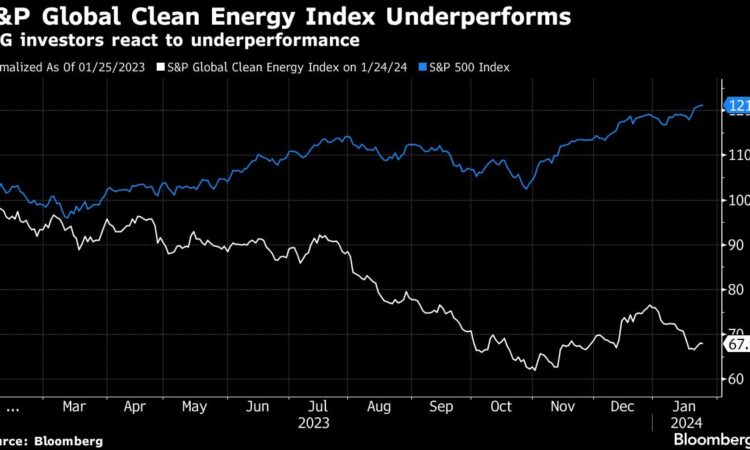
(Bloomberg) — For the first time ever, ESG funds suffered net global outflows amid a major exodus by US investors from environmental, social and governance strategies.
Most Read from Bloomberg
US fund clients withdrew a net $5.1 billion in the final three months of 2023, according to a fresh analysis by Morningstar Inc. published on Thursday. Combined with $1.2 billion of outflows in Japan, that was too severe a retreat for Europe’s $3.3 billion of net inflows to bolster the global market.
Read More: A Few Big ETFs Account for Record US Outflows: ESG Investing
In all, the global sustainable fund market experienced net redemptions of $2.5 billion in the fourth quarter, marking an historic low point for the industry. US skepticism toward ESG follows years of attacks by Republicans who accuse the strategy of being “woke” and anti-capitalist. Legislators in New Hampshire have even sought to criminalize ESG. At the same time, investors have started to question the strategy’s staying power, after an extended period of poor financial returns on a relative basis.
ESG fund withdrawals in the US coincided with a huge slump in traditional green stocks, with the S&P Global Clean Energy Index down more than 20% last year, compared with a 24% increase in the S&P 500. For the whole year, US investors redeemed a total of $13 billion from ESG funds, the Morningstar data show.
The retreat from ESG also lies in the failure of actively managed strategies from firms including Parnassus Investments to draw in clients, according to Morningstar’s analysis. Even in Europe, which is by far the world’s biggest market for ESG products, fund flows were buoyed by $21.3 billion of allocations into passive strategies, while actively managed funds lost almost $18 billion.
BlackRock Inc., the world’s biggest asset manager, topped Morningstar’s league table of sustainable assets under management with $318 billion at the end of the fourth quarter. Of that, more than $270 billion was passively managed, including via BlackRock’s iShares products, Morningstar estimates.
The biggest manager of active ESG strategies was Amundi SA, with just over $84 billion in assets. Amundi’s passive offering was almost as big, at $77 billion, making it the third-biggest manager after BlackRock and UBS Group AG.
The “disappointing reality is that active managers failed again to prevent redemptions in a corner of the market where it’s easier for them to prove their worth,” Hortense Bioy, global director of sustainability research at Morningstar, said in the report. “By contrast, passive funds demonstrated consistent resilience.”
BlackRock’s resilience within the ESG market comes despite the asset manager often finding itself at the center of Republican-led efforts to ban the strategy. Chief Executive Officer Larry Fink, once a public proponent of ESG, last year said he’s stopped using the label because it’s become too politicized.
Morningstar says its analysis covers a fund universe that includes strategies claiming to focus on sustainability, impact or ESG.
Flows into European ESG funds, though still positive, were way below levels seen the previous quarter, when the strategy attracted $11.8 billion in net new money. In the US, meanwhile, the pace of outflows was almost double the $2.7 billion registered in the third quarter.
Much of that development should be seen against the context of persistently high interest rates, fears of a recession as well as anxiety relating to the spread of war, Morningstar said. Even so, redemptions last quarter left a bigger dent in ESG funds than in conventional portfolios, the researcher’s data showed.
Net outflows represented a decline of 0.1% relative to total global sustainable fund assets. For the broader fund universe, net outflows were equivalent to 0.05% of the total, Morningstar said.
The outlook is far from hopeless, though, according to Bioy.
“The global ESG fund flow picture in the last quarter may look bleak, but ESG funds in Europe – by far the largest market – continued to hold up better than the rest of the fund universe,” she said.
Bioy also noted that the value of global ESG fund assets continued to rise, gaining 8% to $3 trillion in total. That increase “leveled with the growth rate for the broader global mutual fund and ETF market,” according to Morningstar.
(Adds context from sixth paragraph.)
Most Read from Bloomberg Businessweek
©2024 Bloomberg L.P.






